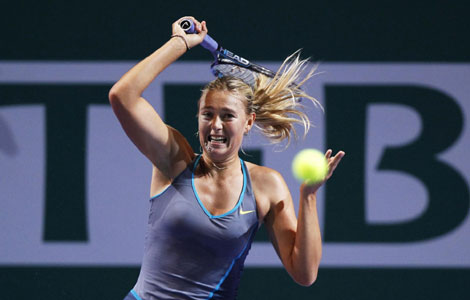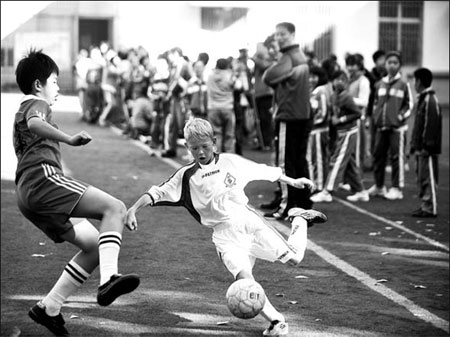Media criticized for take on soccer match
Updated: 2011-10-27 08:05
By Xu Wei and Jin Zhu (China Daily)
|
|||||||||||
|
A boy from Ditan Primary School tries to tackle a Russian player during the soccer match. [Provided to China Daily] |
On Monday, a soccer team from Ditan Primary School in Beijing's Dongcheng district lost 11-0 to Russian primary school team Irkutsk Dinamo in a 40-minute game, prompting an outpouring of criticism from commentators and Net users.
A picture posted on Sina Weibo, a micro-blogging website, shows the Chinese students are much taller and apparently stronger than their Russian counterparts. This prompted some to wonder why the Chinese team suffered such a lopsided defeat.
"The (Ditan) children were out of breath after 20 minutes," complained Zhang Bin, a reporter from the Beijing Times.
A China Central Television reporter wondered why the Chinese players couldn't just bully the Russians.
 |
Wei Ying, deputy headmaster of Ditan Primary School, said that she never expected the match to cause such an uproar.
"We intended to arrange the match to ignite the interest in soccer among the students," Wei said. "But now the immense pressure seems to push children away from soccer."
Wei said the intense coverage the match attracted could indeed be a setback for the sport.
"Some children might care about the score, some may not, but the intense media coverage and the highlights on television might hurt them and their parents," she said.
Wei was concerned that afterward parents might prevent their children from playing soccer anymore.
Wei pointed out that the Russian players receive professional training and the Chinese students were nowhere near that level. On Tuesday, another Beijing team, Yueye from Nanhudongyuan Primary School, lost 7-3 to the Russian team.
Ma Dexing, a well-known sports writer, said Ditan Primary School's decision to accept the friendly match was praiseworthy.
"It is irresponsible for some media to highlight the score," Ma said. "The purpose of such soccer is fun and to develop good health, rather than developing talents or professionals."
Ma said that for years the Chinese people have been focused on scores and the World Cup, but that "as a result, Chinese soccer keeps decaying".
Indeed, China's soccer scene could hardly afford to have the negative attention drive young players away from the game. The China Football Association said the country had 8,000 registered players. In comparison, Vietnam had 50,000 and Japan 500,000.
Cai Wei, head coach of the Nanhudongyuan Primary School team that lost to the Russians on Tuesday, said that match was a success despite the defeat.
"Our players performed well, even though the match did reveal big gaps between the children of the two countries in terms of physical quality and professional soccer training," he said.
He said his players were naturally very frustrated after the loss because his team was among the best in Beijing's primary schools.
"They are usually match winners and have never suffered such a heavy loss," he said.
However, Cai said youth soccer needed support from parents and schools for the sport to develop.
Schools feared having to assume responsibility if students were injured and thus do not encourage training, Cai said. Beijing had 144 students in primary and junior high school playing soccer last year, and only 10 of those were well-trained, he said.
"Most parents are unwilling to send their children to play football due to injury concerns, and many believe playing football cannot promise a bright future," Cai said.
China Daily
- Lottery sales boost the elderly's welfare
- Media criticized for take on soccer match
- School under fire for uniforms with firm's name
- US urged to stop Taiwan arms sales
- TV regulation may hurt profits: experts
- Call to play key role for peace
- Earth prepares for 7 billion inhabitants
- Tide turns against small businesses
Hot Topics
Libya conflict, Gaddafi, Oil spill, Palace Museum scandal, Inflation, Japan's new PM, Trapped miners, Mooncake tax, Weekly photos, Hurricane Irene
Editor's Picks

|

|

|

|

|

|








